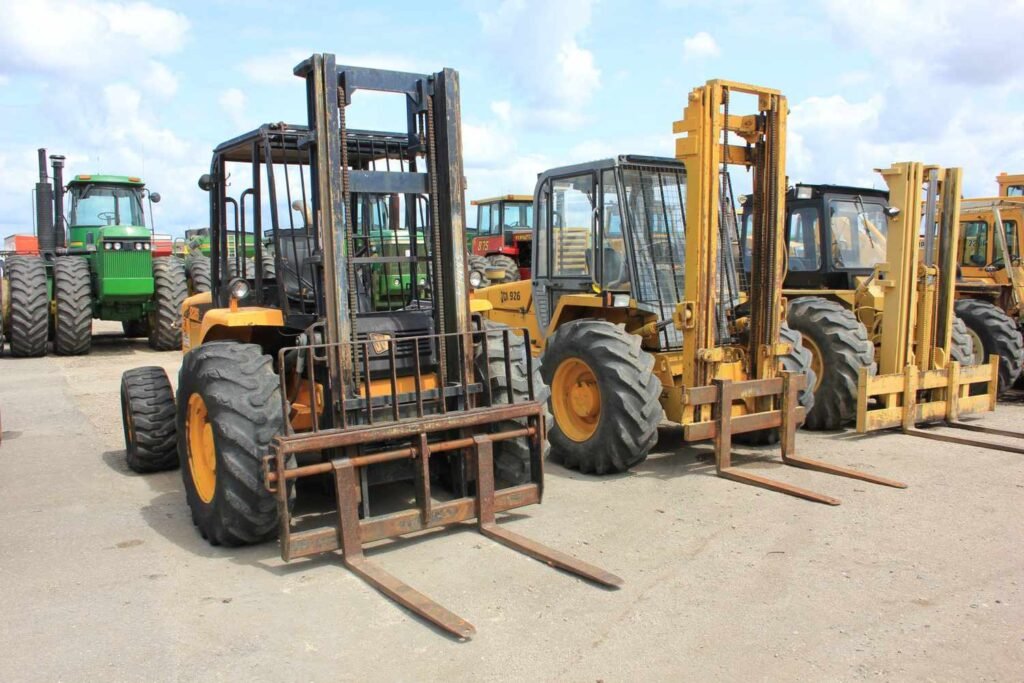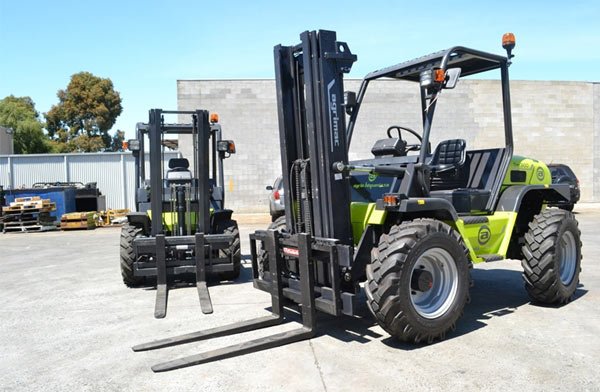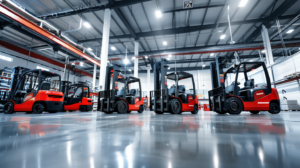The growing demand for versatile, durable, and efficient material-handling equipment has led to a surge in the popularity of all-terrain off-road forklifts, particularly those manufactured in China. These machines are designed to navigate challenging terrains while ensuring safety and efficiency in various industrial applications. However, purchasing a Chinese all-terrain off-road forklift requires careful consideration of several factors, from understanding your specific needs to evaluating the manufacturer’s credibility. This article will guide you through the essential steps involved in making an informed purchase.

1. Understanding All-Terrain Off-Road Forklifts
All-terrain off-road forklifts are robust machines engineered to operate on rough, uneven surfaces. Unlike traditional forklifts, which are confined to smooth, indoor environments, these forklifts are equipped with large, rugged tires, advanced suspension systems, and powerful engines. They are commonly used in construction sites, agricultural fields, logging operations, and other environments where conventional forklifts would struggle.
2. Why Choose Chinese All-Terrain Off-Road Forklifts?
China has become a global leader in the manufacturing of industrial machinery, including forklifts. Chinese manufacturers offer a wide range of all-terrain forklifts that are cost-effective without compromising on quality. Additionally, many Chinese companies have adopted advanced technologies and stringent quality control measures, ensuring that their forklifts meet international standards. The combination of affordability, innovation, and reliability makes Chinese all-terrain off-road forklifts an attractive option for businesses worldwide.
3. Identifying Your Specific Needs
Before diving into the purchase process, it’s crucial to clearly identify your specific needs. Consider the following aspects:
- Terrain Type: What kind of terrain will the forklift be operating on? Whether it’s muddy, rocky, or sandy, different terrains require specific features in a forklift.
- Load Capacity: Determine the maximum load weight the forklift needs to handle. This will influence the engine power and stability requirements.
- Lift Height: Consider the maximum height the forklift will need to lift materials. This is particularly important in construction and warehousing applications.
- Frequency of Use: How often will the forklift be used? Frequent use demands a more durable and possibly more expensive model.
- Budget: Establish a budget range that aligns with your operational needs and financial capacity.
4. Researching Chinese Manufacturers
With the rapid expansion of China’s industrial sector, the number of forklift manufacturers has grown significantly. Conduct thorough research to identify reputable manufacturers. Consider the following:
- Reputation: Look for manufacturers with a solid reputation both domestically and internationally. Online reviews, testimonials, and industry awards can provide valuable insights.
- Product Range: A manufacturer with a diverse product range is likely to have a better understanding of the market and the ability to cater to various customer needs.
- Export Experience: Manufacturers with extensive export experience are more likely to understand international standards and compliance requirements.
- Certifications: Ensure the manufacturer has relevant certifications, such as ISO 9001, CE marking, or other quality assurance certifications recognized globally.

5. Evaluating Product Specifications
Once you’ve shortlisted potential manufacturers, delve into the specifics of the forklifts they offer. Key specifications to evaluate include:
- Engine Power: A more powerful engine will be necessary for heavy loads and difficult terrains.
- Tire Quality: High-quality, all-terrain tires are essential for stability and traction on rough surfaces.
- Hydraulic System: A reliable hydraulic system ensures smooth lifting and lowering of loads, even under challenging conditions.
- Safety Features: Look for safety features such as rollover protection, load backrests, and operator presence detection systems.
- Ease of Maintenance: Consider the availability of spare parts and the simplicity of maintenance procedures.
6. Comparing Prices
While Chinese all-terrain forklifts are generally more affordable than their Western counterparts, prices can vary significantly depending on the manufacturer, model, and specifications. Obtain quotes from multiple manufacturers and compare them. Remember that the cheapest option isn’t always the best; consider the long-term value, including maintenance costs and resale value.
7. Requesting a Product Demo
Before finalizing your purchase, request a product demonstration. A demo allows you to see the forklift in action, assess its performance, and ensure it meets your expectations. Some manufacturers offer virtual demos if an in-person visit isn’t feasible. Pay attention to the following during the demo:
- Handling and Maneuverability: How easily does the forklift handle different terrains? Can it navigate tight spaces effectively?
- Comfort and Ergonomics: Is the operator’s seat comfortable? Are the controls intuitive and easy to use?
- Noise Levels: Excessive noise can be a safety hazard and a sign of mechanical issues. Ensure the forklift operates smoothly without undue noise.
8. Reviewing Warranty and After-Sales Support
Warranty and after-sales support are critical factors in the purchase decision. A comprehensive warranty provides peace of mind and protection against manufacturing defects. Evaluate the manufacturer’s after-sales services, including:
- Warranty Coverage: What does the warranty cover? Is it limited to specific parts, or does it include the entire machine?
- Service Network: Does the manufacturer have a service network in your region? Access to local service centers can significantly reduce downtime.
- Spare Parts Availability: Ensure that spare parts are readily available and reasonably priced.
- Technical Support: Reliable technical support is crucial for troubleshooting and resolving any issues that arise during operation.

9. Understanding Import and Logistics Considerations
Purchasing a Chinese all-terrain off-road forklift involves navigating import regulations and logistics. Consider the following:
- Import Duties and Taxes: Familiarize yourself with the import duties, taxes, and other fees applicable in your country. These costs can significantly impact the overall price.
- Shipping and Delivery: Determine the shipping options available. Sea freight is the most common method for large machinery, but it requires careful planning for customs clearance and local transportation.
- Lead Time: Be aware of the lead time from order placement to delivery. This includes manufacturing time, shipping duration, and customs processing.
10. Ensuring Compliance with Local Regulations
Ensure that the forklift complies with local safety and environmental regulations. This may involve obtaining specific certifications or modifications to meet regional standards. Failure to comply can result in fines, legal issues, or operational disruptions.
11. Negotiating the Purchase Agreement
Once you’ve selected the right forklift, it’s time to negotiate the purchase agreement. Key elements to negotiate include:
- Price and Payment Terms: Discuss payment terms, including any deposits required and the schedule for balance payments.
- Delivery Schedule: Confirm the expected delivery date and any penalties for delays.
- Warranty and Service Terms: Ensure that all warranty and service terms are clearly documented.
- Training and Installation: Some manufacturers offer training for operators or installation assistance as part of the purchase package.

12. Preparing for Arrival and Operation
As your forklift is prepared for shipment, start preparing your site for its arrival. This includes:
- Operator Training: Ensure that operators are adequately trained to handle the new forklift safely and efficiently.
- Site Preparation: Prepare the operational site, including any necessary adjustments to accommodate the new equipment.
- Safety Protocols: Review and update safety protocols to integrate the new forklift into your operations seamlessly.
13. Final Inspection and Acceptance
Upon delivery, conduct a thorough inspection of the forklift. Check for any damage during transit, verify that all specifications match your order, and ensure that all promised accessories and documents are included. If everything is in order, you can proceed with final acceptance and begin integrating the forklift into your operations.
14. Ongoing Maintenance and Support
Regular maintenance is essential to keep your all-terrain off-road forklift in optimal condition. Follow the manufacturer’s maintenance schedule and keep detailed records of all service and repairs. Establish a relationship with a local service provider or the manufacturer’s service network to ensure timely support when needed.

15. Conclusion
Purchasing a Chinese all-terrain off-road forklift is a significant investment that requires careful planning and consideration. By understanding your specific needs, researching reputable manufacturers, evaluating product specifications, and negotiating favorable terms, you can make an informed decision that enhances your operational efficiency and productivity. Remember that the right forklift is not just a piece of equipment but a vital component of your business’s success.
Frequently Asked Questions (FAQs)
1. What are the key benefits of Chinese all-terrain off-road forklifts? Chinese forklifts offer cost-effectiveness, advanced technology, and compliance with international standards, making them a reliable and affordable option.
2. How can I verify the quality of a Chinese forklift manufacturer? Check for certifications like ISO 9001, customer reviews, and export experience. Request product demonstrations and visit the manufacturing facility if possible.
3. What should I consider when comparing forklift prices? Consider the overall value, including engine power, durability, safety features, maintenance costs, and warranty coverage, not just the initial purchase price.
4. Are there any import restrictions for Chinese forklifts? Import restrictions vary by country. Check with your local customs authority for specific regulations, duties, and taxes applicable to importing industrial machinery.
5. How important is after-sales support when purchasing a forklift? After-sales support is crucial for maintaining the forklift’s performance and longevity. Ensure that the manufacturer offers reliable technical support, spare parts availability, and a solid warranty.
6. Can I customize my Chinese all-terrain off-road forklift? Yes, many Chinese manufacturers offer customization options to meet specific operational needs, including engine power, tire type, and additional safety features.





